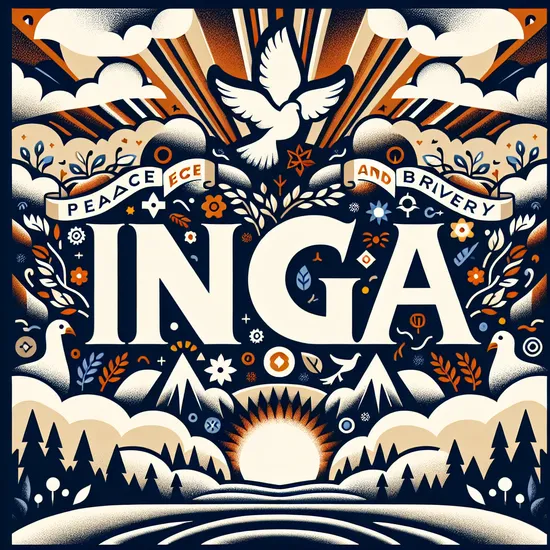Inga - Meaning, Origins, Gender and Global Popularity
Meaning of Inga
The name Inga holds the meaning of guardian of peace and protection. It is often associated with strength and bravery, reflecting a sense of watchfulness and nurturing qualities. These characteristics make the name appealing to many cultures, as they symbolize strength and compassion, instilling a sense of security and care in those who bear it.
Find more names related to the name Inga.
Guardian,
Peace,
Protector,
Leader,
Scandinavian,
Norse,
Norwegian,
German,
Pronunciation of Inga in Norwegian
/ˈɪŋɡə/ - Inga
- /ˈɪ/: as in 'i' of 'bit'
- /ŋ/: as in 'ng' of 'sing'
- /ɡ/: as in 'g' of 'go'
- /ə/: as in 'a' of 'sofa'
To English speakers, pronounce it like 'Ing-guh', with stress on the first syllable.
Origin of Inga
The name Inga has roots in the Scandinavian tradition, primarily flowing from old Norse mythology. Historically, it denotes affiliation with the Scandinavian gods, particularly Yngvi, the god of fertility and peace. As a name, it serves as a cultural vessel, carrying messages of prosperity and goodwill that span generations.
Gender Neutrality of Inga
Inga is predominately used as a female name, yet in some instances, it serves as a gender-neutral name. In countries like Sweden and Germany, its popularity varies between genders, highlighting its versatile usage. Historical figures named Inga include both men and women, embodying the name's cultural richness and adaptability.
Popularity of Inga
Inga has witnessed fluctuating popularity, achieving peak interest in the Nordic countries. Its appeal remains steady in places like Germany and Russia, though waning in other regions. Over decades, the name's modern renaissance in popularity charts owes much to renewed interest in traditional names.
Global Usage of Inga
The name Inga resonates globally, with notable presence in countries like Norway and Finland. Although pronounced similarly, regional differences like Germany’s softer emphasis enrich its cultural texture. Such nuances contribute to a broader cultural appreciation, fostering intercontinental connection through its diverse usage.
| Global Distribution and Gender Ratio of the Name Inga |
| Country |
Usage % |
Female % |
Male % |
| LV |
26.75% |
99.72% |
0.28% |
| RU |
18.67% |
100% |
0% |
| US |
8.69% |
98.25% |
1.75% |
| DE |
6.17% |
98.77% |
1.23% |
| UA |
5.79% |
100% |
0% |
This analysis of gender and popularity by country is derived from data provided by the Gender API.
Characteristic Traits of People Named Inga
- Empathetic: Shows understanding and shares feelings.
- Courageous: Faces challenges with bravery and determination.
- Peaceful: Naturally exudes calmness and strives for harmony.
- Loyal: Consistently supports friends and family with unwavering devotion.
Career Paths for People Named Inga
- Healthcare: Often drawn to professions that care for others, such as nursing or therapy.
- Education: Frequently becomes passionate educators or child care workers.
- Social Services: Attracted to roles that involve community support and development.
- Creative Arts: Often excels in painting, writing, or music, expressing empathetic values.
Unique and Interesting Facts about Inga
- Film Presence: The name often appears in Nordic films, symbolizing strength and depth.
- Literary Usage: Frequently used in literature to represent characters with resilience.
- Mythological References: Linked to Norse legends and tales related to protection.
Notable Figures Named Inga
- Inga Sempé: Acclaimed French designer known for innovative products.
- Inga Swenson: American actress notable for TV and stage performances.
- Inga Nielsen: Renowned Danish operatic soprano with an illustrious career.
Similar Names
-
Inge: A name with Norse roots signifying ancestor's protection. Often interchanged with Inga due to shared heritage.
-
Ingrid: Sharing etymological roots, this name means beautiful and relates to peace in Scandinavian languages.
-
Aina: A Finnish name that speaks of forever and joyfulness.
-
Signe: Represents victory and spiritual meaning of being novel or special in Norse traditions.
-
Linnea: The name means lime tree and is associated with sweetness and connection to nature.
-
Saga: Evokes the spirit of a narrator or historian within Norse mythology.
-
Freya: With meanings centered around noble light, it is often synonymous with goddess of love.
-
Evike: This Hungarian variant stresses femininity and traits of grace.
-
Kirsten: An essentially Scandinavian name associated with Christianity and stability.
-
Silje: Carries a comforting meaning of blind faith in Norwegian culture with a serene context.
